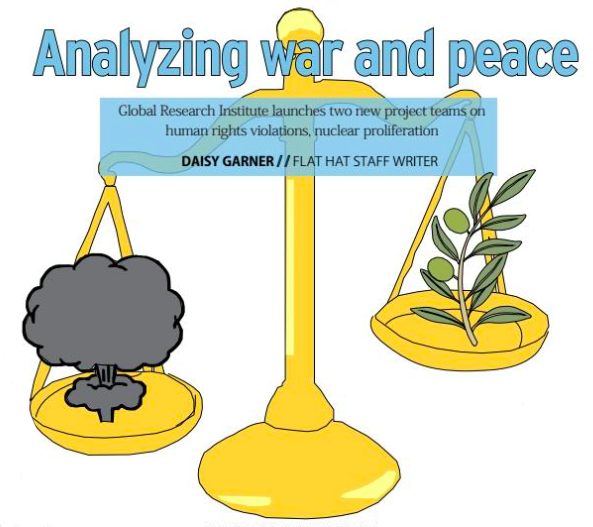This fall, the College of William and Mary’s Global Research Institute introduced two new undergraduate research labs. Professor Jeffrey Kaplow’s NukeLab will address different aspects of international nuclear proliferation and Kelebogile Zvobgo’s International Justice Lab will focus on global human rights and justice issues.
Both labs will place an emphasis on joint student-faculty research and strive to provide students pursuing international relations with new opportunities for academic enrichment.
The International Justice Lab will be the Global Research Institute’s first lab focusing solely on human rights institutions, and NukeLab will be the first lab focusing on nuclear security.
NukeLab’s three core projects focus on various aspects of nuclear proliferation, and all projects are ultimately designed to formulate answers to policy problems.
In NukeLab’s first project on assessing proliferation risks, researchers will focus on analyzing which countries are the most likely to seek out nuclear weapons. Researchers will use data that they obtain to develop a proliferation risk score.
Part of the funding for this project comes
from a federal grant from the Air Force Academy and the Defense Threat Reduction Agency, which looks at global nuclear threats and weapons of mass destruction.
Mapping nuclear nonproliferation regimes will be NukeLab’s second project.
Student researchers will focus on analyzing how membership in the nuclear nonproliferation regime affects the policy choices regarding nuclear proliferation that a country ultimately makes.
This project will analyze institutions and agreements and treaties that hinder countries from obtaining nuclear weapons. By using tools featuring participation patterns, the project will produce a dataset of country membership in the nonproliferation regime.
NukeLab’s third project, which analyzes the past and future of nuclear proliferation, will focus on the evolution of motivating factors behind nuclear proliferation over time, and will attempt to determined what nuclear proliferation will look like in the future.
Kaplow discussed his desire to bring social science tools into his lab’s focus on policy.
“One of my real interests is in trying to do good social science work that can also be relevant to the policy world,” Kaplow said. “And that is one of the goals at NukeLab, is to bring these social science tools to bear on important policy problems that we face in the nuclear security community.”
The International Justice Lab will be the Global Research Institute’s first lab focusing solely on human rights institutions but will mirror existing GRI initiatives including the American Bosnian Collaboration Project and ongoing African development projects.
Within the International Justice Lab, Zvobgo will continue research collaboration with the Security and Political Economy Lab, her former research lab at the University of Southern California, and the National Science Foundation.
The International Justice Lab’s three core projects focus on international human rights, transitional justice and international laws and courts. The first project focuses on public opinion on human rights and how these ideas correspond with national interests. It will also focus on other accountability mechanisms, which provide relief and redress to communities harmed by development projects.
Transitional justice, including widespread and systematic human rights violations and the legacies of it, as well as tools countries can adopt to deal with human rights violations, will be the International Justice Lab’s second project.
Lab researchers are currently focused on truth commissions, which promote accountability on human rights violations through narratives on political violence.
The International Justice Lab’s third project focuses on international laws and courts. It focuses on how governments respond to obligations in law, how the public views international courts and how international courts can change the view of their legitimacy.
Zvobgo said she is committed to fostering undergraduate research to encourage diversity among those who graduate school and academia.
“At present, women, first-generation students and students of color are disproportionately likely to exit and not pursue graduate studies in this area, and that then shapes the candidate pool for jobs which then shapes what the professor looks like, which then shapes the types of questions we ask, the ways we teach, the views and experiences that are represented and not represented,” Zvobgo said. “This is part of why I am so committed to having undergraduate research experience through my lab.”
Bilen Zerie ’23 said she appreciated Zvobgo’s efforts to promote diversity in the International Justice Lab.
“I really appreciate professor Zvobgo’s emphasis on recruiting and promoting diversity not only in the IJL lab, but in IR research as a whole,” Zerie said. “For me, it is inspiring and encouraging to see a female immigrant from Africa like myself succeed in starting a new, groundbreaking lab, and her mentorship is truly invaluable.”
Zerie said she is specializing in evaluating the usage of truth commissions.
“Alex, the other freshman on the team, and I are compiling research on the role that children play in truth commissions, which are quasi-judicial bodies established to investigate a series of human rights violations committed and to promote reconciliation,” Zerie said.
Both Kaplow and Zvobgo envision their labs forming connections to other universities, allowing students to work with colleagues beyond the College. Kaplow and Zvobgo also both anticipate that their student researchers take on more challenging tasks as the labs mature.
Kaplow will also teach a class in the spring on nuclear politics issues and Zvobgo, who has been hired as an assistant professor in the government department, hopes to teach a class about transitional justice when she begins teaching.

